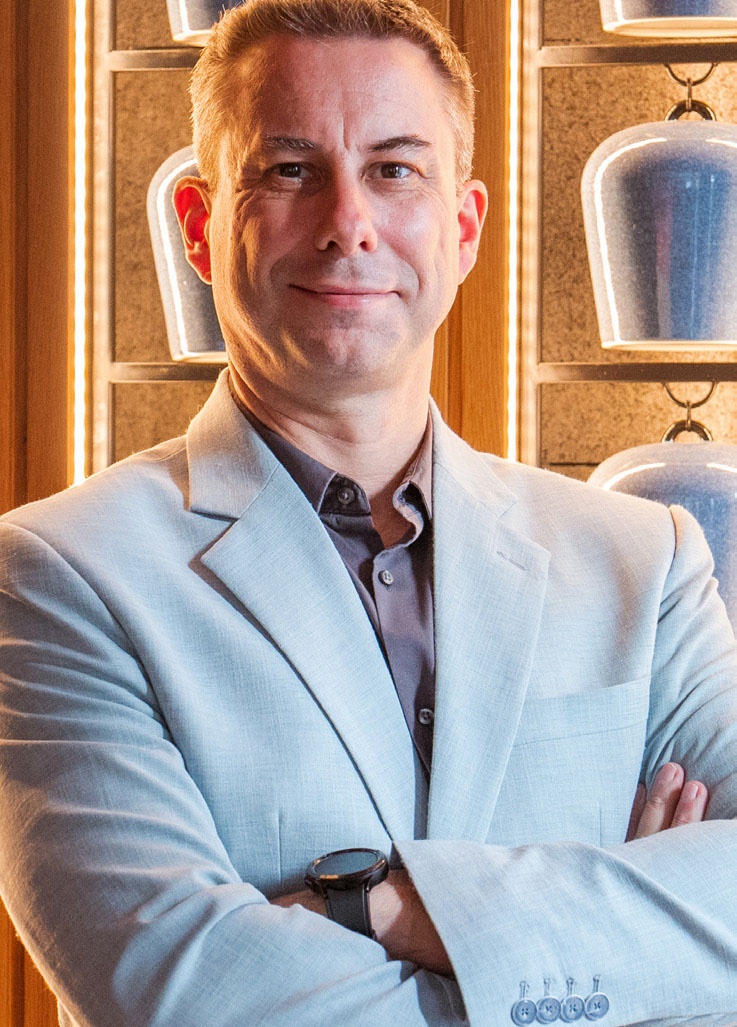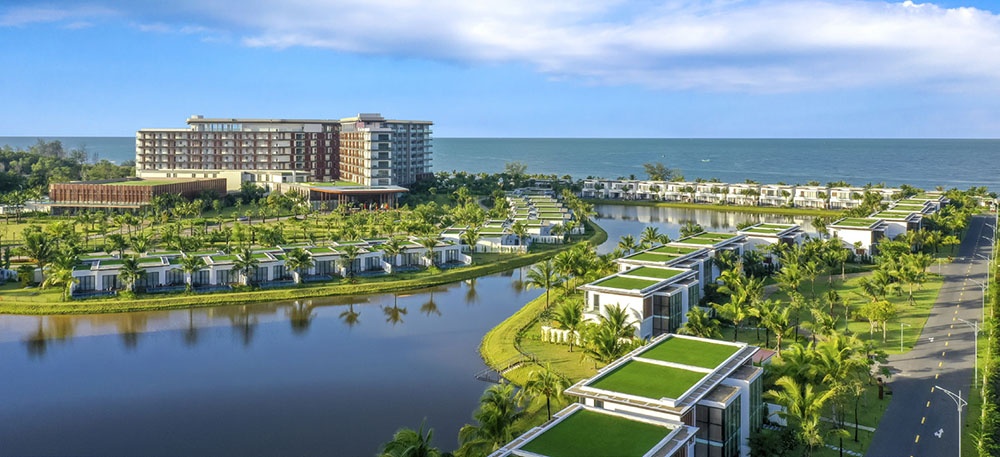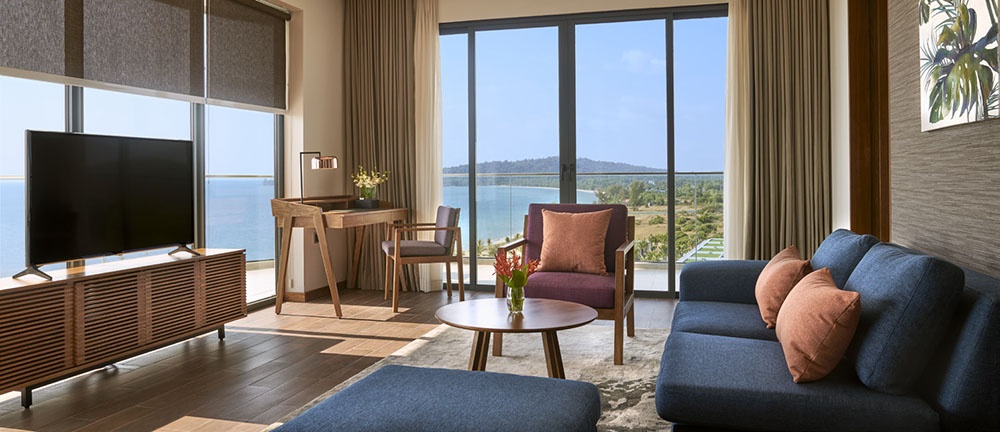Vietnam centres on eco-luxury tourism and hospitality
02:06 | 28/01/2025 Print Article
Hoteliers are gearing up for a busy year. General manager of Mövenpick Resort Waverly Phu Quoc Claudio Schibli taked with VIR’s Nhat Ha about his insider view on the important roles of green transition and innovative measures in enhancing hotel sustainability practices.
How do you evaluate the roles and efforts of hoteliers in the digital-green transformation for tourism development in Vietnam and worldwide?
 |
| General manager of Mövenpick Resort Waverly Phu Quoc Claudio Schibli |
Sustainability has been a cornerstone of our operations since early 2022. We continuously assess our needs, plan operational changes, and implement innovative measures to enhance our sustainability practices.
In terms of digital transformation, our central teams have successfully implemented mobile and online check-in processes over the past few years. Building on this, we introduced a digital welcome voucher for our members last year.
Additionally, we integrated our in-house mobile app with our backend digital solutions. This app provides guests with comprehensive resort information, enables service requests, and features the full in-room dining menu, all in a digital format.
On the green transition, while we have implemented measures to conserve and reduce energy in 2024, our focus for 2025 is to explore smart devices and additional energy-efficient technologies. The initiatives aim to further reduce energy consumption and align with our ongoing efforts towards official green certification, where we are making commendable progress.
What do you think of the market in 2025, particularly in such venues as Phu Quoc?
The tourism and hotel market in 2025 presents an exciting opportunity for destinations like Phu Quoc, which is already experiencing robust growth. Unlike many other regions where the industry is just returning to 2019 levels, the island has already surpassed these benchmarks, solidifying its position as an emerging destination. While no significant new hotel openings are expected in 2025, this stability in supply, coupled with growing demand, positions the market for further growth.
Phu Quoc is uniquely poised to benefit from increasing international interest, particularly during the winter months when visitors from colder climates seek warmer destinations.
Additionally, the island is well-situated to capture burgeoning intra-Asia and domestic travel segments during the summer.
A notable trend shaping tourism in 2025 is the growing preference for meaningful travel experiences. Visitors are increasingly seeking off-the-beaten-path activities that immerse them in local culture and nature.
For Phu Quoc, this shift highlights the need for sustainable tourism practices that preserve the island’s natural beauty and charm. Striking the right balance between catering to this demand and protecting the environment is critical to ensuring long-term success.
Have you got any suggestions for Vietnam’s authorities to promote tourism globally?
First, I would emphasise the importance of strengthening marketing efforts internationally. Vietnam has an incredible cultural heritage, breathtaking natural landscapes, and a unique culinary scene, but global awareness of these aspects is still limited compared to some competing destinations.
To address this, we need well-coordinated marketing campaigns that use both traditional and digital platforms.
For example, partnerships with international travel influencers, showcasing authentic stories and experiences, can deeply resonate with potential travellers.
Additionally, investing in modern technologies, like virtual tours or interactive social media campaigns, could captivate a broader audience.
Another essential focus would be on enhancing air connectivity and simplifying travel processes. Direct flight routes from major global hubs to key Vietnamese cities, combined with simplified visa policies, can make Vietnam more accessible. Expanding the visa-free entry programme to include more countries or streamlining the e-visa
system could significantly lower barriers for international tourists. Accessibility is key when travellers decide between destinations.
Furthermore, I believe sustainable tourism development is critical for long-term success. Global travellers today are increasingly conscious of their environmental impact.
Vietnam, with its natural beauty and biodiversity, can position itself as a leader in ecotourism by promoting destinations like Phong Nha-Ke Bang or the Mekong Delta.
Lastly, I highlight the need for infrastructure improvement and better connectivity within the country. When combined with smart tourism initiatives, like multilingual mobile apps for travel guidance, Vietnam can cater more effectively to a global audience.
 |
Have you faced any obstacles in your role when it comes to fiercely competitive hotels and resorts?
Having served as resort manager for three years and having been based in Phu Quoc for nearly six years, I am deeply familiar with the hotel and the local supply market.
Despite the competitive landscape on the island, with numerous accommodation options, the key challenges remain consistent: attracting and retaining skilful staff, enhancing English language proficiency, and fostering a strong service mindset.
I know my team exceptionally well, as most of the senior and middle management members are long-standing contributors. Over the past months and years, they have driven significant improvements within their respective teams. However, one major ongoing challenge is adapting to the ever-changing source markets.
 |
What priorities have you applied to encourage professional staff to contribute to the hotel, along with training courses to help them get acquainted with new rules?
We continually invest in training and development for all team members, focusing on diverse areas, including English language proficiency. For potential team members at all levels, we emphasise courses designed to enhance skills, expand knowledge, and build leadership and business acumen, as well as soft skills. In 2025, we plan to expand our offerings with self-paced online training programmes tailored to various levels.
Additionally, we are fortunate to collaborate with partners, particularly in F&B, who provide specialised product courses and training to further enrich our team’s expertise.
Creativity is a particular area of focus for me. I believe that everyone, regardless of level, religion, or cultural background, possesses some form of creativity.
Through various internal initiatives, we have successfully enhanced the look and feel of our canteen, back-of-house areas, and even certain front-of-house events. This is something I aim to nurture further in the coming year.
Which special and unique eco-luxury products have resort offered to guests?
We pride ourselves on offering special and unique eco-luxury products and services that go beyond a traditional stay, providing our guests with meaningful and sustainable experiences. For instance, we are introducing a short tour to a local bee farm, where guests can gain insight into the fascinating process of honey production, learn about the care and sustainability efforts around bees, and understand the critical role bees play in our ecosystem.
Additionally, our commitment to sustainability extends to our culinary offerings. This initiative will enable us to provide guests with organically grown vegetables, fruits, and herbs, ensuring they enjoy the freshest and the most natural ingredients during their stay.
Looking towards the future, we are exploring renewable energy solutions, including the potential use of solar power. While these are long-term projects, their implementation will significantly reduce energy consumption and reinforce our dedication to eco-friendly practices.
These efforts reflect our broader commitment to sustainability, ensuring that every aspect of our operations aligns with our values of responsible resource use and environmental stewardship.
Nhat Ha
Post path: https://vir.com.vn/vietnam-centres-on-eco-luxury-tourism-and-hospitality-122046.html
